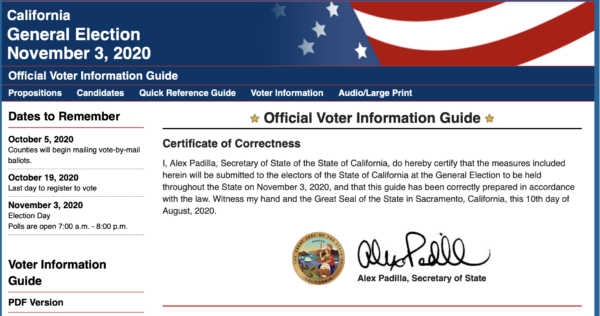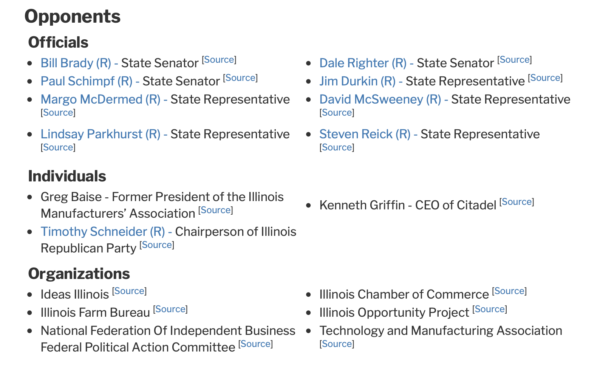This is the a post for anyone who wants to talk about this year’s Florida Amendments.
The intention is to provide a jumping off point for discussion, and a place for BJ folks to share their views, not to suggest to anyone how they should vote.
Anonymous at Work asked for this one for Florida, and graciously agreed to share his views to get us started. There are 6 this year, so there’s quite a bit of ground to cover.
Anonymous at Work
Disclaimer: I’m a transplanted Florida resident of now 6 years (I chanted “One of us! One of us!” when I got my driver’s license changed). I am a non-practicing attorney with a background in regulatory law and an interest in politics but not so much in local/state politics. Around election time, I pay some attention and do some extra reading on ballot initiatives and the like. While observing professional dystopian governance and ratf*cking in Washington State, I started emailing friends and family before elections, if they wanted my opinion. That said, I have a day job, and am not up on a few details this year.
For those unaware, ballot propositions in Florida require 60% to pass and can either be popular, referred or put on the ballot by a Constitutional Revision Panel, which recommends changes to the state Constitution every 20 years. A good idea except that it gave us such chestnuts in 2018 as “Allowing offshore oil drilling or we’ll ban indoor vaping.” The group in 2018 was entirely Republican. Restoring voting rights to ex-felons was due to voter initiative and a major shocker.
This year we have six Amendments, four from voters and two from the Legislature. In a decidedly non-Floridian manner, they are labeled Amendment 1, Amendment 2, Amendment 3, etc, and none directly involve alligators. I have a pretty clear idea about 3 of them but one of the voter initiatives and the 2 Legislature Amendments have me nervous that I’m missing something.
For my sources, I primarily used the following:
…..
Amendment 1: Immigrants that aren’t citizens can’t do citizen-things like vote
Citizen Requirement for Voting Initiative
Legislative Summary: Amends Section 2 of Article VI of the Florida Constitution to state that only citizens of the US that are 18 years old or older are qualified electors in Florida
Pros: Reaffirms that non-citizens can’t do things limited to citizens, primarily vote.
Cons: This doesn’t change anything but it is entirely symbolic of xenophobia and/or racism.
League of Women Voters: No.
My rec on #1: No, spitting optional. This Amendment has absolutely no effect and the League of Women Voters came out against it for that reason. The only reason to make this difference is to reaffirm xenophobia and racism.
…..
Amendment 2: $15 Minimum Wage by 2026
$15 Minimum Wage Initiative
Legislative Summary: Raises minimum wage to $10.00 per hour effective September 30th, 2021. Each September 30th thereafter, the minimum wage shall increase by $1.00 per hour until the minimum wage reaches $15.00 per hour on September 30th, 2026. From that point forward, future minimum wage increases shall revert to being adjusted annual for inflation starting September 30th, 2027.
Pros: While it’s not close to a living wage for much of Miami, it’s a sight better than the current $8.46 currently. It also ties future automatic increases to “inflation” to prevent stagnation, although Florida has a set formula that increases the wage (but at a significantly slower pace).
Cons: Anyone else hear alarm bells go off with “inflation” and with the term generally “minimum wage”? Me too. What counts as “inflation” is left undefined and could be short-circuited by the Legislature, especially since Florida is under one-party rule and gerrymandered heavily. Florida exempts tipped employees but their gross tips still have to add up to current minimum wage. Same with full-time HS or College students and for 90 days after new employment for those under 20 (i.e. training wage). The pace, as mentioned is glacial and wouldn’t result in a livable wage at any time. Finally, I do worry that a future (all-Republican) state Supreme Court could interpret the Amendment as “locking in” a minimum wage to $15.00 per hour plus whatever “inflation rate” the Republican Legislature deems appropriate.
League of Women Voters: Yes.
My rec on #2: YES. Half a loaf is a good start. Also, seems sure to pass given the disparity in funding ($4.7 million by supporters vs. $400k by opponents), and the fact that Chamber of Commerce has been silent on this one.
…..
Amendment 3: Jungle (Boogie) Primaries
Top-Two Open Primaries for State Offices Initiative
Legislative Summary: Allows all registered voters to vote in primaries for state legislature, governor, and cabinet regardless of political party affiliation. All candidates for an office, including party nominated candaidates, appear on the same primary ballot. Two highest vote getters advance to general election. If only two candidates qualify, no primary is held and winner is determined in general election. Candidate’s party affiliation may appear on ballot as provided by law. Effective January 1, 2024.
Quick Note: “As provided by law” is necessarily vague. The change is to the state Constitution and not the underlying statutes that govern the conduct of elections. Florida had nine officially recognized political parties able to hold their own closed primaries (exception for primaries with only one party of two candidates; those were open).
Pros: Jungle primaries are a big deal some places, like Washington State. I am generally supportive of them as giving better options in a general election rather than moving the fight to the (lower-turnout, fanatic-dominated) primaries. For a formerly closed-primary state, it offers some voting power at the state level to the minority party, especially for a highly packed-and-crack state like Florida.
Cons: Minority representation would be a problem, which is the leading argument by the League of Women Voters. Both political parties are against it, for valid reasons that it would weaken their ability to identify preferred candidates and manage internal business. Despite claims otherwise, it wouldn’t eliminate ratf*cking by third party general ballot candidates (Privet, Comrade Stein!) but allow for self-designated candidates to dilute, divide and deceive voters during the primary.
League of Women Voters: No.
My rec on #3: A very soft “No”? This Amendment has good arguments for and against it. The organizations lining up against it are a who’s-who of organizations, both for good and evil. The supporters are two single-issue advocacy groups and a CEO of an investment firm whose statement reads like bad High Broderism with many paeans to centricism and “both sides” and the holiness of “registered independents”.
My personal voting preference is for ranked choice, like in Maine. Voting reform, if done badly, is a major step backwards.
This is the one voter initiative where I wonder, “Did I miss anything?”
…..
Amendment 4: Double-secret probation for voter initiatives
Voter Approval of Constitutional Amendments
Legislative Summary: Requires all proposed amendments or revisions to the state constitution to be approved by voters in two elections, instead of one, in order to take effect. The proposal applies the current thresholds of passage to each of the two elections.
Quick Note: Florida’s threshold is 60%, so already a super-majority.
Pros: Direct democracy has a decidedly mixed history both in state and in the nation (*waves at California*) and there are some true stinkers being submitted and taken up (See Amendment 1 above) for, let’s be generous and say, “whimsical” causes. Florida already has a super-majority requirement about which I am uncertain.
Cons: If you are going to have a ballot initiative process at any level with any entry method AND require a super-majority, you can pick between “run twice” and “super-majority” but not both without being hypocritical. Additionally, this won’t stop “whimsical” ratf*cking initiatives that are both deceptive to common voters and backed by the Legislature. This Amendment is solely to prevent another Felony Restoration amendment from ever passing, again.
League of Women Voters: No.
My rec on #4: The hardest of “No”s possible. Additional steps towards supporters, such as raspberries, rude gestures, pressed hams, and unwrapped hams are optional, while flaming bags of (hopefully) pet poo might be illegal in your community. The unexpected restoration of voting rights to felons, before the Republican Legislature hijacked it into a poll tax, left Republicans terrified. This is the reaction.
…..
Amendment 5: Bigger window for homestead exemption (Save Our Homes) transfer
Limitations on Homestead Property Tax Assessments; increased portability period to transfer accrued benefits
Legislative Summary: Proposing Amendment to the state Constitution, effective January 1, 2021, to increase, from 2 years to 3 years, the period of time during which accured Save-Our-Homes benefits may be transferred from a prior homestead to a new homestead.
Pros: Legislative Amendment passed unanimously by both chambers. Current system appears to go from sale to next January 1st as “one year” and the next January 1st as “two years” for purposes of keeping a homestead exemption. Timing could matter, as could setbacks if a person is either building a new home or between houses for another reason.
Cons: Costs money that isn’t otherwise replaced. Additionally, this Amendment has hyper-technical changes to the State Constitution to override a hyper-technical provision, rather than take the direct route and repeal the hyper-technical provision to the State Constitution and legislate (and, you know, take responsibility for your actions).
League of Women Voters: No.
My rec on #5: Help? I distrust *this* aspect of direct democracy the most. I can kinda sorta maybe follow the arguments here but my preference is for legislation/regulation to handle these aspects of governance. Putting them in the State Constitution, with a 60% super-majority requirement to change, eligible once every two years, is a bad idea.
BUT, no spending on either side and it passed unanimously. What am I missing?
…..
Amendment 6: We Love Puppies, Key Lime Pies and Veterans (and their spouses and their spouses’ homestead exemptions)
Ad Valorem Tax Discount for Spouses of Certain Deceased Veterans Who Had Permanent, Combat-Related Disabilities
Legislative Summary: Provides that the homestead property tax discount for certain veterans with permanent combat-related disabilities carries over to such veteran’s surviving spouse who holds legal or beneficial title to, and who permanently resides on, the homestead property, until he or she remarries or sells or otherwise disposes of the property. The discount may be transferred to a new homestead property of the surviving spouse under certain conditions. The Amendment takes effect January 1, 2021.
Pros: See Amendment 5 above.
Cons: See Amendment 5 above, but do a few lines of meth of the alligator stripper’s tail (use your imagination).
League of Women Voters: No.
My rec on #6: WTF Florida? This is the same as #5 but smells worse. Much more hyper-technical for a part of the state Constitution, and I am always critical of anything that resembles “We love hugs, puppies, rainbows, and offshore limited liability holding companies” in ballot initiatives. Again, people with deeper knowledge of Florida, what am I missing?
Discuss!
Florida Peeps: 6 Constitutional Amendments in 2020Post + Comments (42)





